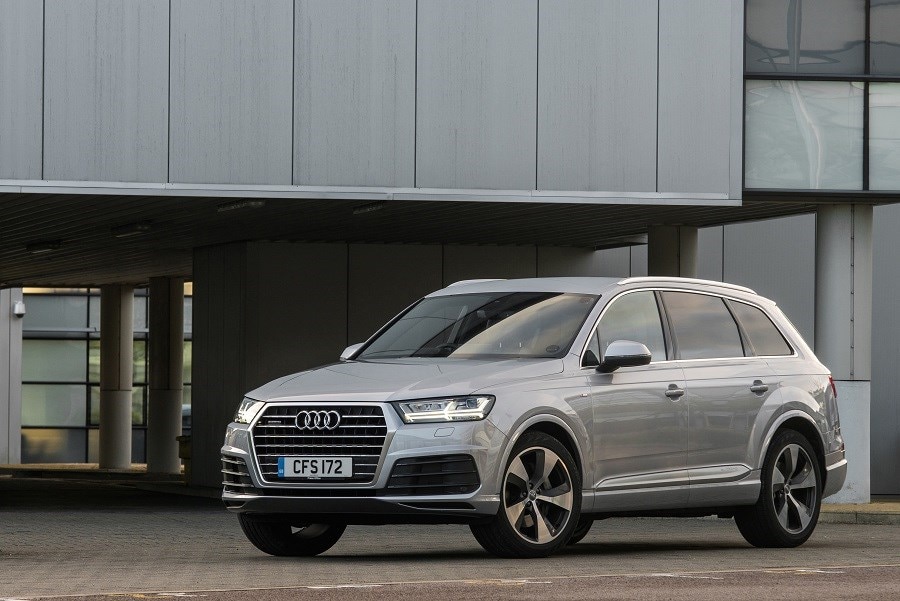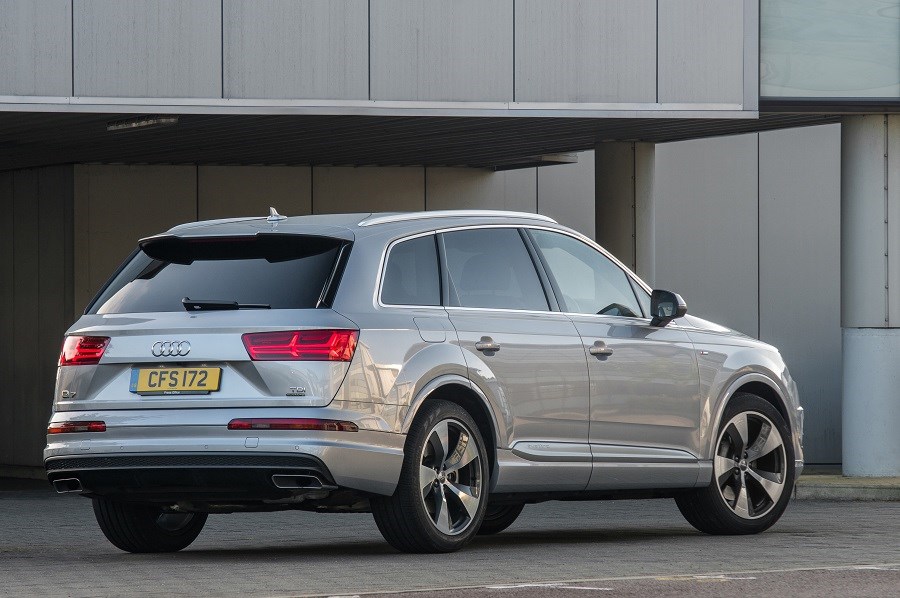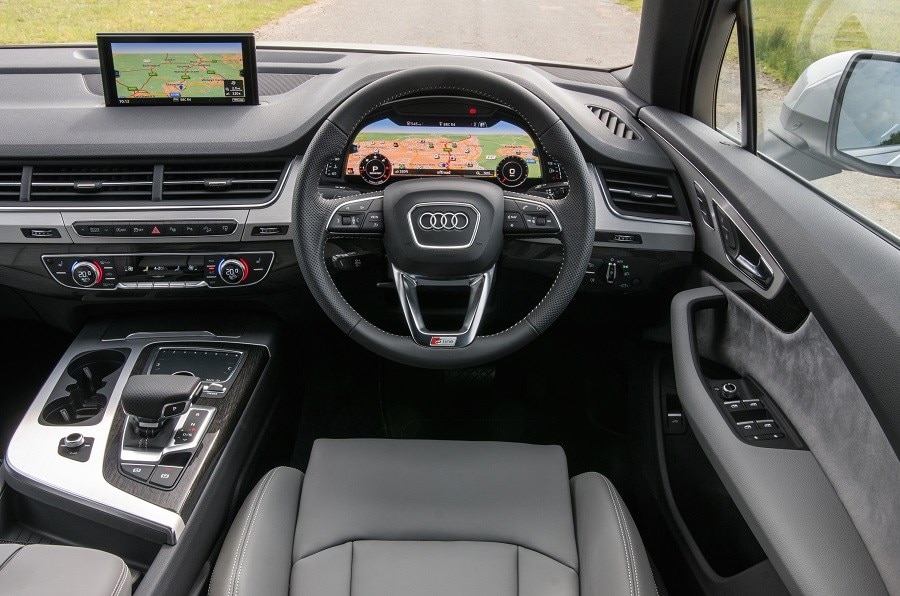Model Review
The Audi Q7 made its debut in 2005 as the manufacturer’s first true SUV—there had been four-wheel-drive Allroad estates in the past, but this was the first rival that could compete against the likes of Land Rover and BMW.
That said, it was an off-roader better suited to the road, labelled as a ‘soft-roader’ at the time, although still came with permanent all-wheel-drive. Perhaps what it’s best known for is being the first road car to be fitted with a V12 diesel engine, and offered nearly 500bhp, as well as utilising some of the diesel technology found in the manufacturer’s diesel racing cars.
A facelifted version followed in 2010 and featured new front and rear LED lights, updated styling and a newer version of Audi’s MMI infotainment display, which, among other things, allows control of the radio and navigation systems.
While the Q7 is often criticised for its meaty looks, it’s always important to cite that this is where Audi’s SUV offensive started, with the German manufacturing now having five crossovers in its range.
Latest model
Audi unveiled its second-generation Q7 at the 2015 Detroit Motor Show where it showcased a lighter and sportier offering
Audi managed to shave an impressive 325kg off the previous generation model’s kerb weight, with the model powered exclusively by a 3.0-litre V6 diesel from launch. The new Q7 also debuted a host of new tech that would be rolled out to further Audi models in the years to follow. An all-new MMI infotainment system featured as well as a new smartphone interface, with the Q7 being one of the first models to come with Android Auto and Apple CarPlay connectivity.
Safety is also very important, as adaptive cruise control and traffic jam assist - which is where the car can essentially drive itself in slow-moving traffic – were both included.
A bold new grille and a more boxy design featured on the stylish Q7, with Audi boasting far more practicality and interior space over the previous iteration.
A plug-in hybrid e-tron model would follow, as would the SQ7—a 429bhp, 4.0-litre diesel-powered V8 flagship model, which featured a host of new innovative engine technologies to cut emissions.
The two latest editions to the range include the Black Edition models, as well as a top-of-the-range Vorsprung specification for the SQ7, which added luxuries such as Matrix LED headlights, a head-up display and 22-inch alloy wheels.
Value for money
Prices for the Q7 start from £53,250, so it’s not a cheap car; but the Q7 is all about value for money. Few cars can offer the superb standard equipment levels, punchy V6 diesel engines and practicality that the Q7 can offer, so in that sense it’s more attractive when you look at the list price. Top spec cars are undoubtedly expensive, with the Black Edition model costing nearly £70,000, and the SQ7 another £10,000 on top of that. That said, the focus of this review is purely on the Q7 rather than the sporty SQ7, which has a rather different character.
Standard kit is very comprehensive, with all models coming with Xenon headlights, a digital instrument display, wireless charging and an electric tailgate, to name but a few of the car’s features.
On the used market, first generation Q7s start from as little as £6,000, although the second-generation versions we’re interested in here kick off from around £27,995, which will get you a 2015 ‘SE’ spec car with around 100,000 miles on the clock. Around £31,000 will get you a car of a similar age and spec, with a more moderate 50,000 miles on the clock.
There’s some good savings to be had on nearly-new models, too. We spotted a six-month-old Q7 in high-spec S-line trim for £45,500, which is more than a £10,000 saving off list price.
Looks and image
It’s tough to make a large SUV look stylish but Audi has made a decent job of it here. It has an imposing look, but a smart single frame grille, Xenon or LED headlights (depending on the version) and nice alloy wheel designs gives the Q7 a good presence on the road— but it’s by no means as vulgar as the Mercedes GLE, for example.
The interior design is nothing to get excited about but for sheer usability and build quality, the Q7’s cabin is unrivalled at this price point. Plush materials are used throughout, with all models coming with a swathe of leather, or Alcantara in the case of the top-spec cars. The standard-fit 12.3-inch Virtual Cockpit is a nice touch and is fantastic to use – it essentially allows you to personalise the displays to your tastes – while the MMI display is fantastic to operate. Both are operated by touchpads on the steering wheel which helps to de-clutter the interior of buttons. What’s also noticeable about the Q7’s cabin is just how refined and comfortable it is, too, which makes it ideal for long distance journeys.
The huge weight saving has made a lot of difference to the way the Q7 drives compared to the last version. It’s surprisingly agile for a car weighing considerably over two tonnes, with sharp steering and limited body roll. The Quattro four-wheel-drive system is largely there for grip as it’s unlikely that you’ll see a Q7 off-roading, but it’s certainly handy to know it’s capable.
Adaptive air suspension (on all models as standard minus the entry-level Sport) adds a new level of comfort, and is well worth paying the extra for in our opinion. And for those who want a further degree of sporting agility from their SUV, the SQ7 can happily provide the thrills.
Space and practicality
Unlike other manufacturers, Audi hasn’t forgotten about the importance of offering lots of space from its large SUVs. All but the plug-in hybrid Q7 e-tron (which has its own separate review) come with seven seats, while the seats are configurable, too, thanks to a sliding second row of seats. As with most seven-seaters, though, the rear-most chairs are best reserved for children, or adults on short journeys, as there’s not a huge amount of room back there.
A handy electric tailgate reveals a load space of 295 litres with all seven seats in place. It’s not a lot, but leaves plenty of room for a couple of suitcases. Most Q7 owners will treat their cars as a five-seater for most of the time, which leaves a load space of 770 litres. Leaving just the front two chairs in place will leave a van-like area amounting to 1,955 litres, which is an incredible amount of room to play with. All chairs can be folded individually while the seats can be dropped at the push of a button, which is yet another feature that shows how much Audi wants the Q7 to integrate into family life.
Some Q7 owners might wish to tow with their cars, in which case Sport models can tow 2,800kg, while S-line, Black Edition and SQ7 variants are able to handle 3,500kg.
The Audi Q7 is also a very safe car— recording a five-star safety rating by Euro NCAP. It was highly praised at the time for its safety kit, although some models have now caught up. Standard kit includes an adjustable speed limiter and autonomous emergency braking, while optional extras include self-parking capability and adaptive cruise control in traffic jams, working up to 37mph.
Engines
The Q7 is offered with diesel engines only.
The sole option is a 3.0-litre turbocharged V6 unit, which you can have with either 228bhp or 282bhp – badged as the 45 and 50 TDI variants respectively. Both engines come paired with an eight-speed Tiptronic automatic gearbox and quattro four-wheel-drive.
Even the entry-level engine provides superb performance, and is able to accelerate from 0-60mph in 7.1 seconds, and the more powerful variant being able to achieve it a second quicker. Both engines are commendable, although the less-powerful unit isn’t as refined, and can be noisy under acceleration.
In the past, you could also get the same engine with 215bhp and 264bhp, too, which you’ll likely find when looking through the classifieds.
Running costs
Unsurprisingly given the size of the Q7, it will be a costly car to run, although not exceptionally so. Both engines return a claimed 41.5mpg on the combined cycle, which will be achievable on longer journeys, but not on short runs. CO2 emissions are quite high, though, and range between 177g/km and 178g/km.
Insurance groups are also high, although not any worse than a comparable SUV. The entry-level 45 TDI unit sits in group 42, and the more powerful 50 TDI version in group 46.
You should also be weary of road tax costs – particularly between two and six years of the cars first registration, as you’ll pay £450 a year to tax it in that period because of the Q7’s high list price.
Things to look out for
The Q7 has a solid reliability record, although it’s not without fault. Numerous owners have reported slight interior rattles from their cars, which you don’t expect from a car costing upwards of £50,000. We advise taking any models on a thorough test drive before buying, as any rattles can often be difficult for a dealer to find. There has also been a recall issued for the AdBlue emissions-reducing fluid tank, too.
Rivals
The SUV market is one of the fiercest, so there’s no shortage of rivals to choose from, although we would suggest that the Q7 is probably the best model in its class.
That said, other rivals we would recommend looking at before buying include the BMW X5, Mercedes GLC, Porsche Cayenne, Range Rover Sport, Volkswagen Touareg and Volvo XC90 – all of which are commendable.
Depreciation
As with most high-end luxury vehicles, depreciation is always a big factor. The Q7 is no different, with significant savings often found on nearly-new models. With up to £10,000 off Q7s less than a year old, and second-generation versions starting from just under £30,000 at the time of writing, it’s a car that’s worth buying used, so that much of the depreciation factor has already been absorbed.





